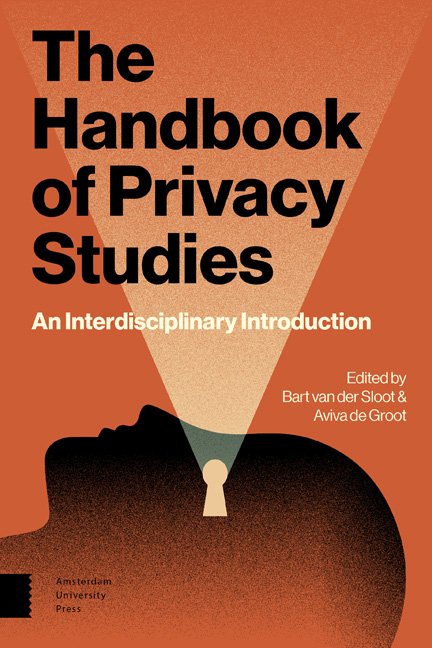Book contents
- Frontmatter
- Contents
- Introduction
- 1 Privacy from a Historical Perspective
- Legislating Privacy: Technology, Social Values, and Public Policy
- 2 Privacy from a Legal Perspective
- Three Dimensions of Privacy
- 3 Privacy from an Ethical Perspective
- Nudging: A Very Short Guide
- 4 Privacy from an Economic Perspective
- Security, Privacy, and the Internet of Things (IoT)
- 5 Privacy from an Informatics Perspective
- Political Science and Privacy
- 6 Privacy from an Intelligence Perspective
- A Privacy Doctrine for the Cyber Age
- 7 Privacy from an Archival Perspective
- Medical Privacy: Where Deontology and Consequentialism Meet
- 8 Privacy from a Medical Perspective
- Privacy Law – on the Books and on the Ground
- 9 Privacy from a Media Studies Perspective
- Diversity and Accountability in Data-Rich Markets
- 10 Privacy from a Communication Science Perspective
- Still Uneasy: a Life with Privacy
- 11 Privacy from an Anthropological Perspective
- About the Authors
Introduction
- Frontmatter
- Contents
- Introduction
- 1 Privacy from a Historical Perspective
- Legislating Privacy: Technology, Social Values, and Public Policy
- 2 Privacy from a Legal Perspective
- Three Dimensions of Privacy
- 3 Privacy from an Ethical Perspective
- Nudging: A Very Short Guide
- 4 Privacy from an Economic Perspective
- Security, Privacy, and the Internet of Things (IoT)
- 5 Privacy from an Informatics Perspective
- Political Science and Privacy
- 6 Privacy from an Intelligence Perspective
- A Privacy Doctrine for the Cyber Age
- 7 Privacy from an Archival Perspective
- Medical Privacy: Where Deontology and Consequentialism Meet
- 8 Privacy from a Medical Perspective
- Privacy Law – on the Books and on the Ground
- 9 Privacy from a Media Studies Perspective
- Diversity and Accountability in Data-Rich Markets
- 10 Privacy from a Communication Science Perspective
- Still Uneasy: a Life with Privacy
- 11 Privacy from an Anthropological Perspective
- About the Authors
Summary
The background of this book
It was the beginning of 2010 when I (Bart) first joined the University of Amsterdam as a privacy researcher. What struck me immediately were two things: how interdisciplinary the topic of privacy was and how limited the interaction was between the different fields, disciplines, and researchers from the various faculties at the university. Out of personal interest and a desire to map the field of privacy, I decided to invite for coffee and formally interview over 50 colleagues about their privacy research. It brought me to the fields of medicine, anthropology, economy, political science, informatics, philosophy, law, sociology, communication science, psychology, and a couple more.
I think I failed miserably at grasping and properly describing everyone's research in the small report I made on the basis of the interviews. Although privacy was certainly the central theme, the role it played in the various disciplines, the methodology they used, and the types of questions scholars were trying to answer varied widely, not to mention the jargon. Some philosophers tried to define the universal value of privacy, while anthropologists and sociologists stressed its contextual and cultural nature; while political scientists viewed data as means of power and control, lawyers tended to see privacy as a right to be safeguarded from intrusions; in communication science and economy, personal information was seen primarily as an asset, while informaticians focused mainly on building secure and confidential information systems without any data leakage.
What became clear from the interviews was that each researcher felt that in order to properly discuss and answer research questions within his own field of research, he needed to have insight into aspects from other disciplines. People working at the informatics department, for example, built information systems in health care environments, and sought a better grasp of informational secrecy and doctor-patient confidentiality in order to properly design infrastructure. People at the medical department of the university called for more knowledge about the legal protection of patient data and the exception in law for using their data for scientific (medical) research. Faced with the different approaches in different countries and regions in the world, lawyers wanted to have more insights from the fields of sociology and anthropology. And people working within the latter disciplines often were more than interested in the ethical debates about values and principles underlying the right to privacy.
- Type
- Chapter
- Information
- The Handbook of Privacy StudiesAn Interdisciplinary Introduction, pp. 7 - 20Publisher: Amsterdam University PressPrint publication year: 2018



